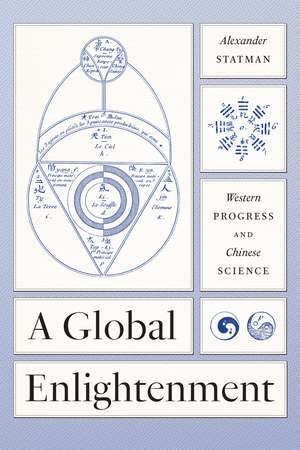A Global Enlightenment: Western Progress and Chinese Science: The Life of Ideas
Autor Alexander Statmanen Limba Engleză Hardback – 26 apr 2023
The Enlightenment gave rise not only to new ideas of progress but consequential debates about them. Did distant times and places have anything to teach the here and now? Voltaire could believe that they did; Hegel was convinced that they did not. Early philosophes praised Chinese philosophy as an enduring model of reason. Later philosophes rejected it as stuck in the past. Seeking to vindicate ancient knowledge, a group of French statesmen and savants began a conversation with the last great scholar of the Jesuit mission to China. Together, they drew from Chinese learning to challenge the emerging concept of Western advancement.
A Global Enlightenment traces this overlooked exchange between China and the West to make compelling claims about the history of progress, notions of European exceptionalism, and European engagement with Chinese science. To tell this story, Alexander Statman focuses on a group of thinkers he terms “orphans of the Enlightenment,” intellectuals who embraced many of their contemporaries’ ideals but valued ancient wisdom. They studied astronomical records, gas balloons, electrical machines, yin-yang cosmology, animal magnetism, and Daoist medicine. And their inquiries helped establish a new approach to the global history of science.
Rich with new archival research and fascinating anecdotes, A Global Enlightenment deconstructs two common assumptions about the early to late modern period. Though historians have held that the idea of a mysterious and inscrutable East was inherent in Enlightenment progress theory, Statman argues that it was the orphans of the Enlightenment who put it there: by identifying China as a source of ancient wisdom, they turned it into a foil for scientific development. But while historical consensus supposes that non-Western ideas were banished from European thought over the course of the Enlightenment, Statman finds that Europeans became more interested in Chinese science—as a precursor, then as an antithesis, and finally as an alternative to modernity.
Preț: 303.38 lei
Nou
Puncte Express: 455
Preț estimativ în valută:
58.05€ • 60.76$ • 48.32£
58.05€ • 60.76$ • 48.32£
Carte disponibilă
Livrare economică 10-24 martie
Livrare express 21-27 februarie pentru 42.34 lei
Preluare comenzi: 021 569.72.76
Specificații
ISBN-13: 9780226825762
ISBN-10: 0226825760
Pagini: 320
Ilustrații: 27 halftones
Dimensiuni: 152 x 229 x 30 mm
Greutate: 0.62 kg
Ediția:First Edition
Editura: University of Chicago Press
Colecția University of Chicago Press
Seria The Life of Ideas
ISBN-10: 0226825760
Pagini: 320
Ilustrații: 27 halftones
Dimensiuni: 152 x 229 x 30 mm
Greutate: 0.62 kg
Ediția:First Edition
Editura: University of Chicago Press
Colecția University of Chicago Press
Seria The Life of Ideas
Notă biografică
Alexander Statman is a Distinguished Scholar and JD candidate at the UCLA School of Law and a former A.W. Mellon Postdoctoral Fellow at the University of Wisconsin-Madison.
Cuprins
Introduction
One. The Death of Voltaire’s Confucius
Two. The Ex-Jesuit Mission in China
Three. The Origins of Esotericism
Four. The Yin-Yang Theory of Animal Magnetism
Five. The Invention of Eastern Wisdom
Conclusion
Acknowledgments
Notes
Bibliography
Index
One. The Death of Voltaire’s Confucius
Two. The Ex-Jesuit Mission in China
Three. The Origins of Esotericism
Four. The Yin-Yang Theory of Animal Magnetism
Five. The Invention of Eastern Wisdom
Conclusion
Acknowledgments
Notes
Bibliography
Index
Recenzii
“A magnificent intellectual history of the late Enlightenment’s interest in Chinese knowledge traditions, revealing their central role in European debates over the meaning and value of ‘progress.’”
“Statman has written a marvelous, engaging, and brilliant book. He is uniquely poised to demonstrate the genuine exchanges between Chinese and Western scholars during this period. His in-depth familiarity with the network of former Jesuit missionaries proves invaluable as he traces with extreme precision intellectual connections between Paris and Beijing. Truly a paradigm-shifting book.”
“This is a wonderful book about wonder—about the Europeans who mediated Chinese thought, history, and technology for their compatriots, and the categories they constructed to house the translated facts and concepts.”
"This erudite and engaging study with its extensive use of archival sources, many of which are studied for the first time, is a welcome addition to the literature on the history of science, the Enlightenment, and Jesuit missionaries in China."
"This book exemplifies the global turn currently underway in the history of science by uncovering the impact of Chinese science on the European Enlightenment, especially on the emerging Enlightenment conception of progress."












